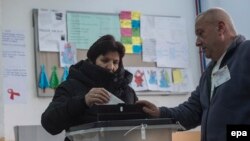Macedonia's political crisis could continue despite early vote
| Publisher | Radio Free Europe/Radio Liberty |
| Publication Date | 26 December 2016 |
| Cite as | Radio Free Europe/Radio Liberty, Macedonia's political crisis could continue despite early vote, 26 December 2016, available at: https://www.refworld.org/docid/5975a3ae23.html [accessed 2 June 2023] |
| Disclaimer | This is not a UNHCR publication. UNHCR is not responsible for, nor does it necessarily endorse, its content. Any views expressed are solely those of the author or publisher and do not necessarily reflect those of UNHCR, the United Nations or its Member States. |
Last Updated: December 26, 2016
 A voter casts a ballot on December 25 in an election rerun that was held in the Macedonian village of Tearce.
A voter casts a ballot on December 25 in an election rerun that was held in the Macedonian village of Tearce.
Macedonia's two main political parties are each vowing to try to form the next government, potentially extending the Balkan country's political crisis, despite a parliamentary election and rerun of a potentially game-changing local vote that awarded victory to the country's long-ruling conservatives.
The VMRO-DPMNE, led by former Prime Minister Nikola Gruevski, has been confirmed as winning 51 parliamentary seats in early elections held on December 11, even after losing a December 25 rerun of the vote in the village of Tearce.
Had the opposition Social Democrats (SDSM) improved sufficiently in its oroginal showing in the re-vote, it could have gained a 50th seat at the expense of the VMRO-DPMNE and prevented it from forming a coalition government.
"As winners of the elections, we will remain dedicated to the future steps of forming a new government," the VMRO-DPME said in a release shortly after the Tearce win.
The victory appears to put the VMRO-DPMNE in position to work with Gruevski's long-time ethnic-Albanian allies in the Democratic Union (DUI), which controls 10 seats, to create a 61-seat parliamentary majority – the smallest possible majority in the 120-seat parliament.
But the Social Democrats, too, are indicating that they plan on leading the next government.
"The new government will be led by SDSM," Reuters quoted a spokesman for the party as saying on December 26. "Macedonia will have a responsible government . . . that will bring democratic changes."
The developments have the potential to extend a political crisis that dates back to early 2015, when the Social Democrats accused the ruling VMRO-DPMNE, led by then-Prime Minister Nikola Gruevski, of illegally wiretapping the telephones of tens of thousands of civilians and political opponents.
The scandal eventually led to massive street protests that prompted EU mediation, Gruevski's resignation, the installation of an interim government, and the early December 11 elections.
With the results, a new government is expected to be in place by February.
'Symbolic' Results
Petre Shilegov, a parliamentarian for the Social Democrats, dismissed the results of the Tearce rerun as "symbolic."
"The people of Tearce, like the rest of the Macedonian voters, opted for change and a better future," he was quoted as saying by the Sarajevo-based BalkanInsight.com.
State election officials ordered the December 25 rerun in Tearce, about 50 kilometers northwest of the capital Skopje, after the Social Democrats complained of voting irregularities there during the original December 11 ballot.
Election results posted on the web of Macedonia's Election Commission show the Social Democrats won 245 votes in the rerun compared to 149 for Gruevski's VMRO-DPMNE party.
But the Social Democrats had needed to secure 307 votes in the village to gain a 50th seat.
Out of 714 registered voters in Tearce, only 402 cast ballots on December 25. The remaining eight votes were split among ethnic Albanian parties.
In the annulled December 11 vote in Tearce, 404 registered voters had cast ballots – with the VMRO-DPMNE winning 91 votes compared to 87 for the Social Democrats. The rest were split among four ethnic-Albanian parties.
With reporting by RFE/RL's Balkan Service, AP, Reuters, Balkan Insight, and Independent MK
Link to original story on RFE/RL website
